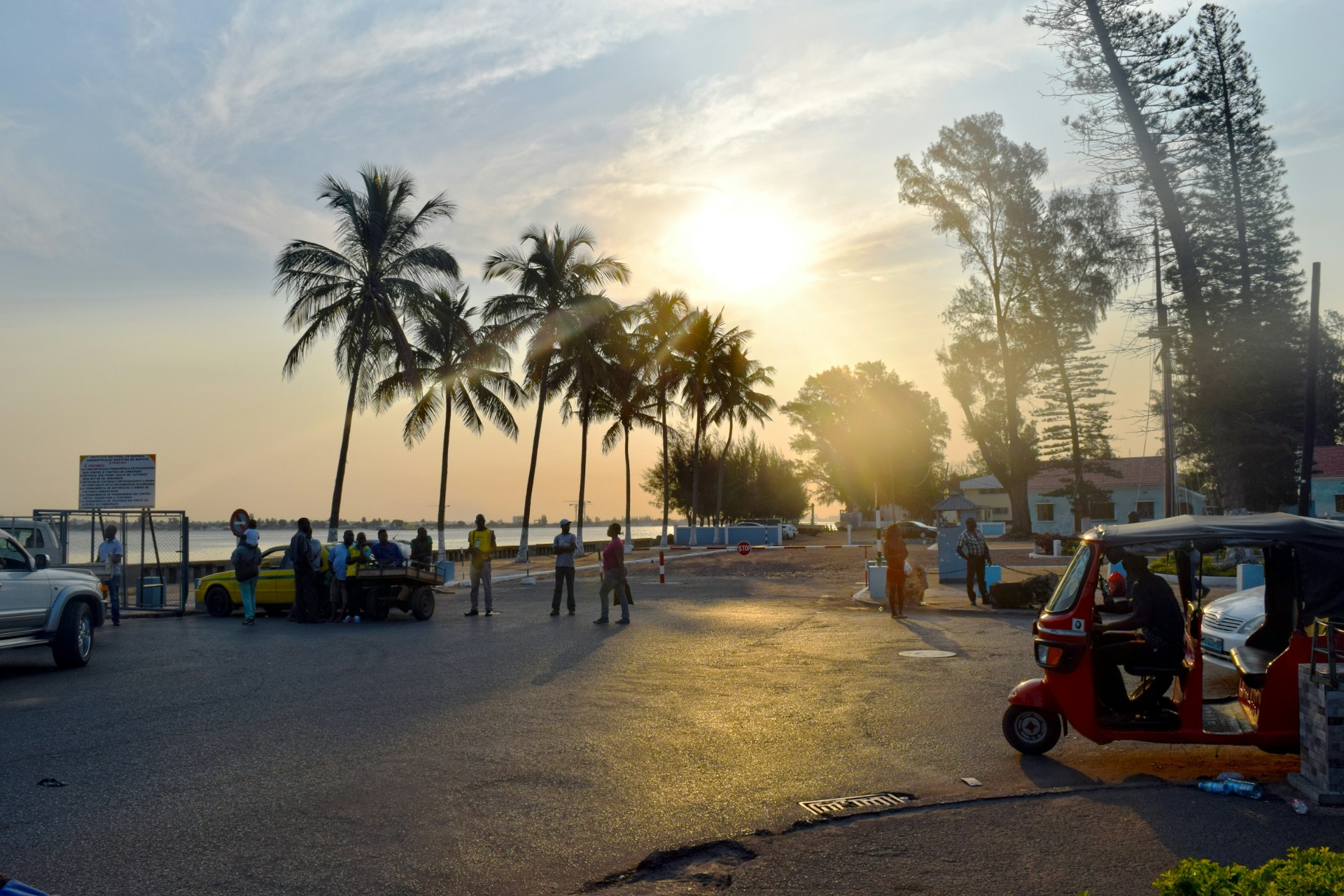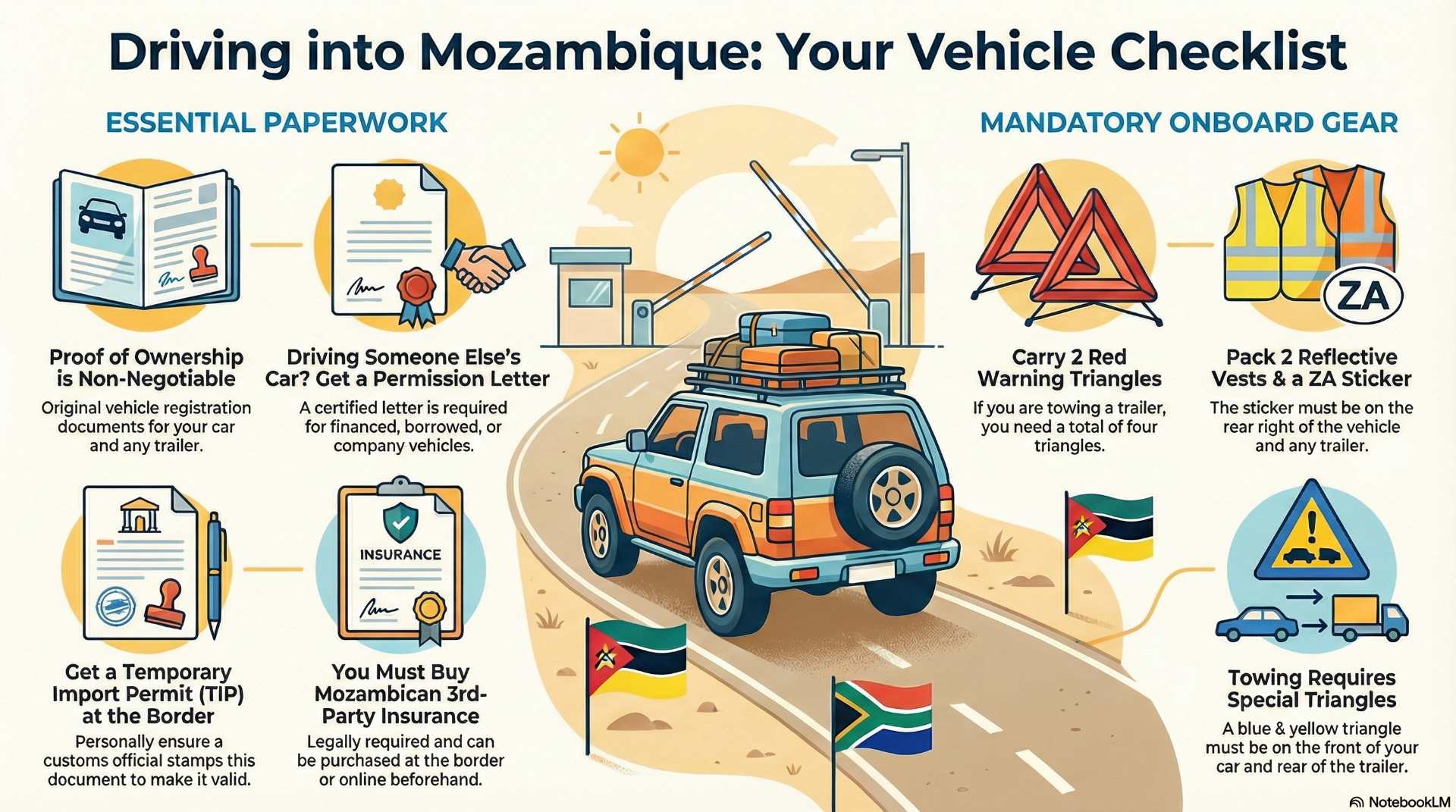
Mozambique border crossing Vehicle and Ownership Documents

Border Crossings: Mandatory Documentation & Requirements (Vehicle & Ownership Documents)
The sources provide detailed and consistent information about the mandatory Vehicle & Ownership Documents required for entry into Mozambique, with a focus on proof of ownership and liability coverage. Compliance with these requirements is critical to avoid fines from traffic police (transitos) and denial of entry at the border.
Get your vehicle documentation wrong, and you're not crossing – it's that simple.
1. Proof of Ownership and Registration
This documentation ensures the vehicle hasn't been stolen and that the driver is authorized to export it.
Registration Documents
The driver must carry the original registration documents for the vehicle (including trailers and boats).
Certified Copy Alternative
If original documents are unavailable (for example, because they're held by the financing bank), a copy of the registration document is acceptable, provided it has been certified by the South African Police Service (SAPS) and is no older than three months.
Boats and Trailers
The same registration requirements apply to all towed items such as trailers, caravans, boats, jet skis, or quads. Don't assume you only need documentation for your vehicle – every item being towed needs its own paperwork.
2. Proof of Authorization (Letter of Permission)
This is required when the driver is NOT the registered owner of the vehicle, preventing theft and unauthorized export.
Vehicles Under Finance/Lease (Bank)
If the vehicle is still financed or leased through a bank, an official letter of authorization from the financing institution is mandatory.
This letter must be:
- Signed and certified by a bank employee or Commissioner of Oaths
- Explicitly state the travel dates and destination country (Mozambique)
Third-Party or Company Vehicles
If the driver is not the registered owner (for example, a borrowed vehicle or company car), a written authorization letter from the owner is required.
Affidavit
If the driver is not the owner or the vehicle is financed, a police affidavit confirming the owner's/bank's permission is needed.
Rental Vehicles
For rental vehicles, the rental company typically issues a "border letter" granting permission to exit and containing the travel dates.
3. Temporary Import Permit (TIP) and Clearance
The TIP is the central document proving the legal presence of a foreign vehicle in Mozambique.
TIP is Mandatory
The Temporary Import Permit (TIP) (or TPIP, formerly DA341) is compulsory for every vehicle, trailer, boat, or jet ski registered outside Mozambique.
Validity and Purpose
The TIP is typically valid for 30 days and serves as proof to customs (Alfândega) that the vehicle must be re-exported to avoid customs duties.
Procedure and Stamps: Critical Step
The form is completed directly at the Mozambican border crossing. It is extremely important that the driver personally ensures the TIP is properly stamped by customs officials – without the stamp, it's invalid.
This isn't a detail to skip or assume someone else will handle. You must verify the stamp yourself before leaving the customs area.
Declaration of Valuables
Via the TIP forms, electronic valuables such as laptops and cameras must also be declared, serving as proof of original import upon re-export. This protects you from accusations of purchasing these items in Mozambique and attempting to smuggle them out.
4. Mandatory Third-Party Liability Insurance
We emphasize the necessity of a special insurance policy for Mozambique.
Compulsory Requirement
Compulsory Third-Party Liability Insurance (TPL) (seguro or liability insurance) is legally required for all non-Mozambican registered vehicles, including trailers.
Mozambican Coverage
This insurance must be purchased from a Mozambican insurer (such as Hollard Mozambique). The reason? Mozambique does not have a state accident fund (like South Africa's Road Accident Fund), so private insurance is the only liability protection.
Purchase and Costs
The insurance can be purchased at the border crossing or in advance online (e.g., through Hollard). Costs are fixed:
- R150 to R280 for a vehicle
- R80 to R140 for a trailer
Additional Coverage Recommendation
Travelers should verify whether their comprehensive vehicle insurance provides cross-border coverage in Mozambique and obtain written confirmation from their insurance company (including travel dates). Your South African comprehensive policy likely doesn't cover you in Mozambique – check before you leave.
5. Mandatory Safety Equipment and Markings
The sources list specific equipment items routinely checked by Mozambican police to avoid fines.
Warning Triangles
Two red warning triangles must be carried in the vehicle. If towing, two additional triangles are required.
Reflective Vests
Two fluorescent safety vests (bright yellow or green) must be carried in the vehicle. They must be worn when the driver repairs the vehicle roadside, unloads cargo, or assists at an accident scene.
Fire Extinguisher
A 1-kg fire extinguisher is required.
Country Identification (ZA Sticker)
A sticker indicating the country of origin (e.g., ZA for South Africa) is mandatory and must be affixed to the right rear of the vehicle and, if applicable, the trailer.
Towing Triangles
When towing a trailer, a blue-and-yellow warning triangle is mandatory. One must be attached to the right front of the towing vehicle and one to the rear of the trailer.
6. Additional or Recommended Documents/Equipment
Spare Key
Carrying an additional/duplicate car key is listed as required. Losing your only key in rural Mozambique creates a nightmare scenario.
Spare Wheel and Tools
A functional spare wheel, jack, and wheel wrench are recommended for safety but not strictly mandatory. That said, attempting to drive Mozambican roads without a spare is foolhardy.
Driver's License
The driver needs a valid driver's license; South African licenses are accepted. For non-SADC citizens, an international driver's license is recommended.